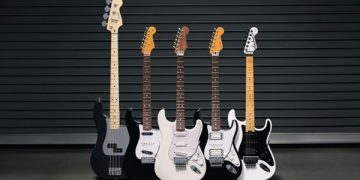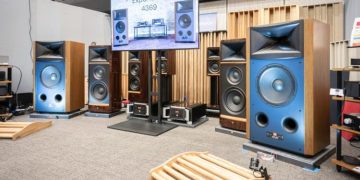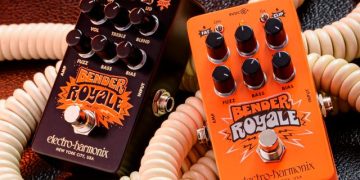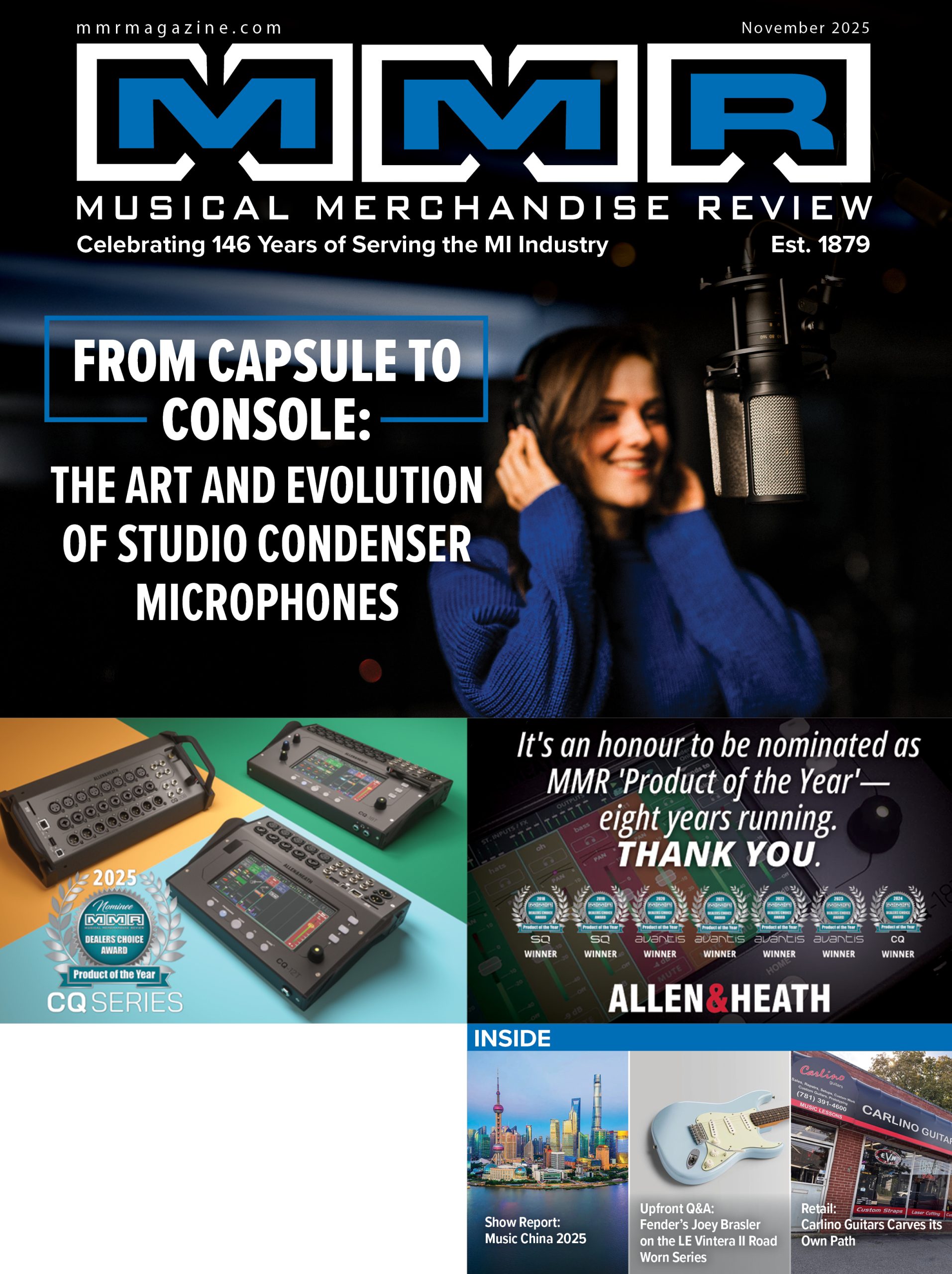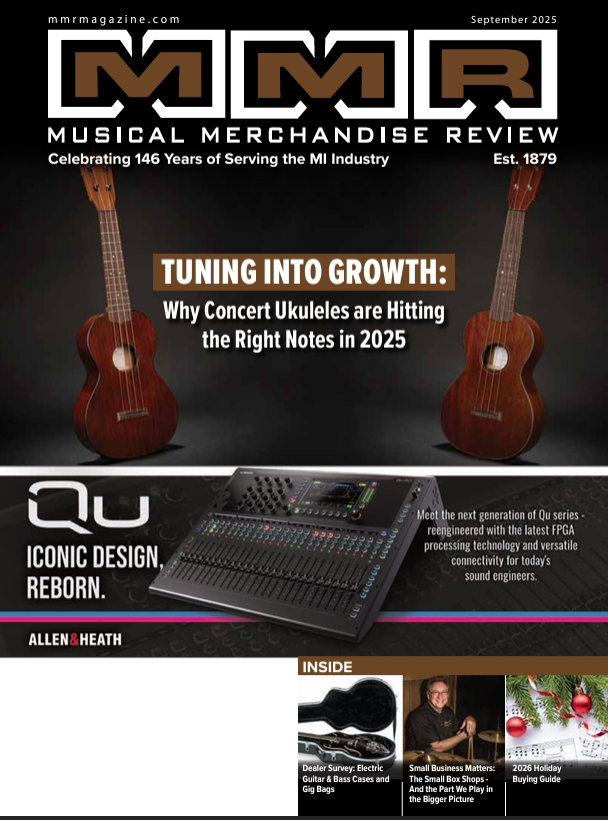 It’s not easy to get musicians to try new types of instruments. Axes like the Chapman Stick remain the purview of a small cohort of intensely left-brain esthetes, while true musical oddballs like the Harpejji or the Eigenharp are almost museum pieces.
It’s not easy to get musicians to try new types of instruments. Axes like the Chapman Stick remain the purview of a small cohort of intensely left-brain esthetes, while true musical oddballs like the Harpejji or the Eigenharp are almost museum pieces.
Then you’ve got Pat Metheny and his insane Orchestrion.
On the other hand, more antique types of instruments, like zithers, autoharps, and dulcimers periodically poke their noses out of the past. They’re currently enjoying a bit of a renaissance, buoyed by the surging interest in vinyl, Americana music, and beard-grooming products. They may be getting airplay now, but one wrinkle of the collective nose of EDM-happy millennials and they may quickly be placed back on a wall peg in a craft burger shop.
But in between, there is a world of exotic instruments, and a small but robust cohort of retailers who have made these their specialty, creating a strong niche supported by adventurous musicians and the country’s growing ethnic diversity. In the process, they reveal a market sector other retailers might consider investigating.
Rockin’ The House
The House of Musical Tradition, in Takoma Park, Maryland is named like an O. Henry short story, and its inventory has a similar number of twists. These include 11-string Turkish ouds, a Chinese Sanxian, and a Japanese Taishokoto. The store, which was voted “Best Place To Buy Instruments” in Washington D.C. City Paper’s Reader Poll in 2016 and 2017, like its website, is a constant tussle between curio shop and earnest retailer, a common problem in this interesting niche. Its origins reflect that: owner David Eisner bought out the retail side of dulcimer maker Musical Traditions in 1972 to establish his store; that American folk instrument then became the thread that led much more deeply into an entire universe of unfamiliar instruments.
“The roots of this go back to when musicians in the 1960s and ‘70s were experimenting with instruments from other cultures, like the Beatles and the sitar, Led Zeppelin and lutes, and Joni Mitchell and the lap dulcimer,” explains Brennan Kuhns, the store’s manager.
Since then, the House of Musical Traditions has become home to a curated array of exotic instruments, some of which are one of a kind, such as a banjo and mandolin mounted back to back and that can be flipped over mid song; others are examples of MI manufacturing industries in Africa and Asia that are almost parallel universes to conventional ones, such as djembe drums from Ghana that come to the store through equally exotic though often unpredictable alternate supply chains. Store staff bring their own knowledge base – for instance, sales associate Stream Ohrstrom has been its resident flute specialist since 1978 and is an expert on the Japanese shakuhachi flute, a four-holed instrument that’s a challenge to simply make a sound with, much less master. “We become experts through immersion therapy,” Kuhns says matter-of-factly. “We’re simply around these instruments all the time.”
It means that staff will spend considerable time on the phone answering abstruse questions about obscure instruments, but he adds, that tends to further deepen the store’s own knowledge base. And the curiosity is infectious; Facebook and other social portals are sending a growing number of inquisitive musicians their way, split between walk-ins (their location near Washington, D.C. assures plenty of cultural diversity) and online visitors. They’ll also get referrals from nearby MI retailers, like Chuck Levin’s Washington Music Center and Potter’s Violins, when those stores get asked about Scottish bagpipes or a Senegalese kora.
Kuhns says nearly three quarters of the store’s revenues still come from relatively conventional instrument sales – the “big four” there are acoustic guitars, banjos, ukuleles and mandolins, the last category also including related instruments like Greek bouzoukis – but that the margins on the more exotic instruments are healthy, especially as the uniqueness, quality and scarcity of an instrument increases in relation to demand for it. Nonetheless, they are careful to make distinctions between mass-produced instruments and more crafted ones; for instance, as African drums have increased in popularity, inexpensive, mass-produced models of lower quality have proliferated. But that category hasn’t reached the point that more popular conventional instruments have, where even entry-level instruments can meet a certain quality minimum. “You can get a decent starter guitar for $200, but for a set of [beginner] bagpipes you’re starting at closer to $800 to $1,200,” he says.
A World Of Music
The website for Todaro Music, in the Philadelphia suburb of Lansdowne, Pennsylvania is filled with instruments that test one’s ability to sound out new words. Stringed instruments such as the cavaquino, the baglama, and the charango, and wind instruments like the quena, the quenacho and the moseno inspire the imagination as much as they challenge the tongue, though, which is why storeowner Joseph Todaro got into MI retail in 1988.
“When I was a kid I listened to the music programs on WXPN, the University of Pennsylvania’s radio station, all the time,” he recalls. “They played world music, and that planted the seed of ethnic and folkloric music in me.”
Todaro Music began with conventional instruments, which it still sells plenty of, but the owner’s curiosity took him to Bolivia and elsewhere in South America, where he researched exotic instruments, established local sources for importing them, and brought a constantly flowing collection through the store. The strategy has proven practical as well as intellectually and emotionally satisfying – as sales of guitars, his main product, began to wane in the last decade, exotic stringed instruments helped pick up the slack, as interest in ethnic music genres increased in the U.S. What’s helping keep business strong, he says, is a willingness to source directly when possible, bringing in high-quality instruments that are palpably better than ones that are mass produced as demand for them grows.
A key relationship in this process for Todaro was a friendship he developed with Daniel Mari, the patriarch of a leading string manufacturer for Flamenco, classical and other types of traditional guitars. He has shared a booth with Mari at NAMM Shows for the last 15 years, which allowed him to roam the furthest reaches of the expo halls in search of unique instruments.
Another epiphany occurred when he noticed that music stores tended to be designed for males. “I used to get lots of posters from manufacturers that showed girls in bikinis,” he recalls.
“It didn’t offend me personally but I saw how it could be offensive [to some]. So I wanted to find ways to make my store look and feel more comfortable for everyone, and the exotic instruments really do help with that – they help make the store an experience. And they help get conversations started more easily: if someone comes in for a piano book and sees something interesting on the wall, it can turn them in a completely different direction.”
Interestingly, the Philadelphia area’s own ethnic enclaves aren’t necessarily a major source of customers; Todaro says that local multicultural musicians tend to have their own sources for their instruments. Instead, he says, his diverse collection will bring in repeat customers from far and wide when they’re in the area. “My store used to be a travel agency, and when they closed they left a world map up on the wall,” he says. “Now, when some customers come in from overseas, it becomes part of a shared experience between us. It’s the magic of the instruments that really make the bond.”
A Musical Petting Zoo
While exotic instruments share the store with conventional ones in most cases, at Lark In The Morning they are center stage all the time. Chulus and chajchas (single goat-toenail rattles) share space with Romanian spruce top, maple body, beech neck balalaikas and Norwegian hardanger fiddles at the compact 400-square-foot storefront in Berkeley in the Bay Area (another 2,000-plus square feet is used for inventory for online sales). These also reflect the store’s price spread, from barely double digits to several thousands of dollars; for instance, an Indonesian Gamelan xylophone will set someone back $5,000.
Owner Eric Azumi took over the store last year, continuing a presence that began in 1974 with an ethnomusicology aficionado who grew it to three locations, including Fisherman’s Wharf in San Francisco and the Pike Place Market in Seattle. The shop went online only for several years before Azumi took it on and gave it a physical space once again, one he playfully characterizes as “a musical petting zoo,” where customers can become acquainted with rare instruments. While come customers still buy on impulse – the store is across the street from an auto repair shop and gets some walk-ins from those waiting for their cars – most are dedicated musicians looking for a challenge, a third or fourth instrument to master. Another cohort are sound designers for firm and television – Pixar and other media-production studios are in the area – looking for new sound effects, such as the $440 ocean harp that can be struck or played with a bow.
Azumi says the real challenge for him is the supply chain. With nearly 3,000 SKUs in his inventory, sourcing a wide variety of instruments means balancing online wholesale suppliers with serendipitous arrivals from individuals selling unique instruments from estate sales and other avenues, sometimes taking them on consignment. The end game is to keep as much diverse inventory on hand as possible, to let buyers touch and feel the instruments first hand, and hopefully encounter something unexpectedly that changes their lives or careers. “People come to the shop because they want to be able to touch an instrument they’ve never seen or even heard,” he says. “That’s something they could never do on the internet.” Exotic instruments aren’t for every retailer, but even a small collection can create a connection point. Joseph Todaro suggests watching for cultural events that might create an opportunity.
For instance, the 2010 World Cup event in South Africa put a spotlight on the African vuvuzela, a two-foot-long plastic horn that emits a loud (120 dB, at the threshold of pain), low (typically around BH below middle C) note, and its indigenous Australian counterpart, the didgeridoo, which is longer and made from wood, and generates more nuanced overtones.
Even a single unique instrument on a wall or in a window can be enough to get a conversation – and a relationship – started.










